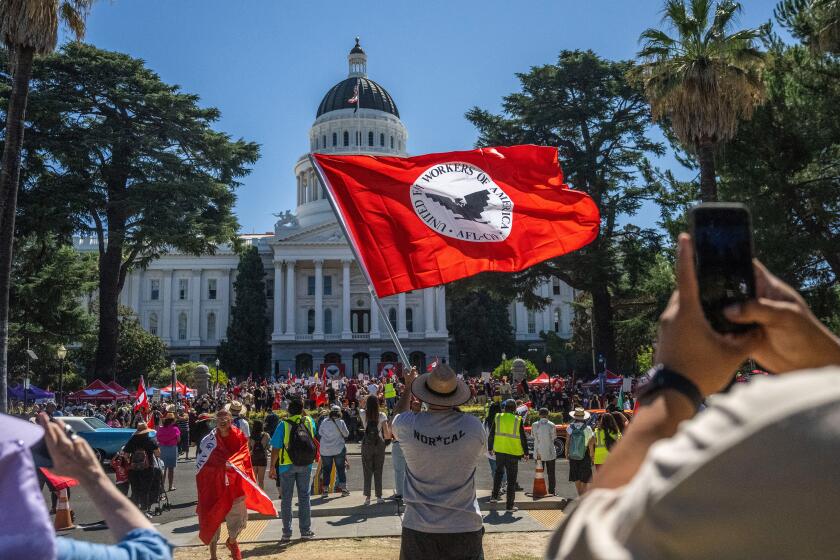Viewpoints : Can Government Help Minority Business?
As the Bush Administration tries to revamp the nation’s policies for aiding minority-owned business, minority business leaders are asking serious questions about whether the government--or their own communities--really plan to address their needs.
For a discussion of the state of minority business development, free-lance journalist Sharon Bernstein interviewed Joshua I. Smith, chairman of the President’s Commission on Minority Business Development and founder of Rockville, Md.-based Maxima Corp., one of the nation’s largest black-owned businesses, and Harold T. Yee, president of Asian Inc., a San Francisco-based company dedicated to advancing Asian-American businesses.
What are the most serious concerns of minority businesses?
Smith: The biggest is the frightening lack of access to capital for both small and minority business. We’re seeing instances where people with contracts from the federal government cannot go to banks and use them as collateral for loans that are necessary for operating costs. It’s due to the fact that, for the most part, small and minority businesses essentially have smaller requirements for loans. A $50,000 loan to a small business for cash flow is really not what banks are looking for. They’re looking for $50-million loans, which essentially take the same amount of time.
Yee: The minority business community is in retreat. As the accusations against so-called reverse discrimination increase, there is a disarming of the thrust of minority business to try to get their fair share.
In addition, minority business as far as the federal government is concerned has pretty much excluded Asian-Americans. For Asian-American firms at the sizes we are talking about, getting loans is not a great problem, but getting access to the federal market through contracts, and for the federal government to assist us in getting to the private market, is a problem.
What role does racism play?
Smith: It’s true that many elements of the society are unaccustomed to seeing minorities and women in business, so there is that initial shock of dealing with that customer. But that’s not the same as racism. It’s kind of hard to say whether that person doesn’t like you because he is a racist or she is a racist or because they’re just uncomfortable. The reason I put it on the point of being uncomfortable is that’s correctable. I don’t know how you correct racism.
And I think the degree to which they’re uncomfortable is changing because of the number of women and minorities who are in business. So over time that’s just going to go away. Hopefully, if we are more productive business-wise, racism will just kind of fall away--if it’s there at all.
Yee: I don’t think racism explains all of it, but it certainly explains some.
Racism also comes into play in the way that the federal government defines minorities. The values of different groups are different and their social structures are different, so you have to treat them differently to determine what is necessary to help each group. In 1990 we must not continue to see American society as black on white, with all other groups a sideshow.
What is the appropriate role for government to play in advancing minority business?
Smith: There is no policy in the federal government for entrepreneurship. We have the Small Business Administration that has turned into a bureaucracy, and it’s losing its advocacy. We need to have advocacy.
Minority business, when you look at it, has no focal point in the federal government. We have a segment of the Small Business Administration, a segment of the Deparment of Commerce--everyone has a segment--but there is no focal point, there is no strength.
Yee: Government should certainly continue to break down the barriers in terms of discrimination. And government should continue to provide entry to primary markets in the governmental sector in the form of contracts and other business arrangements.
But I think government should also keep true to its word, in that if a program is for “minorities,” it should serve each of the minority groups.
Does George Bush care about minority business? And what’s the evidence of that?
Smith: I’m absolutely convinced that this guy genuinely cares. As a teen-ager he was out soliciting funds for the United Negro College Fund. His family has always been involved. George Bush is not an issue. He’s committed to it, but what we have to do is bring it in line with the priorities of this country.
Are you saying that it’s not up to the Administration? Then what is the answer?
Smith: We need more support of minorities in business by the minority communities. I can show you example after example where in the black community and to some extent in the Hispanic community, being an entrepreneur is not a big deal, and it’s not a priority. In a number of ethnic groups it is the creme de la creme . In the Jewish community and the Asian communities it is a priority.
Is that really true that Asian Americans are more entrepreneurial than blacks and Latinos?
Yee: Who knows? Does Joshua have any studies on this or is his perception based on anecdotal evidence? If you measure the number of Asian-American firms, we may have more firms, but what does it mean to have a thousand Korean-owned produce stores? Where are the large companies?
I suggest that the appropriate comparison is not one minority against another minority, but whether a gap exists between a minority and the dominant white community. If Smith thinks there is entrepreneurship in the Asian community and not in the black community, then how come we haven’t reached parity?
And not all Asian groups start even small businesses. Based on personal observations, you certainly have lots and lots of stores in the Confucius-derived societies, such as Korea, Japan, China and Vietnam. I don’t think that statement made by Joshua would apply to the Laotians, Cambodians, Filipinos or Indonesians.
So the answer is simply that minority groups should emphasize entrepreneurship more?
Smith: The first thing we need to do is to convince the minority communities that this is important. In the civil rights movement to a great extent we just flat out overlooked it.
Now, you look in New York and you see blacks trying to expel Koreans, and I’ve said all along that’s the wrong side of the problem. The problem is there aren’t enough black businesses in the communities. Why are you trying to expel those who seek business opportunities? That’s like killing the messenger. The real problem is we need to have viable businesses in the black communities and many of these other communities.
Yee: Joshua doesn’t put any emphasis on the market side at all, in terms of discrimination, in terms of the entry of minority firms into a crowded market where a lot of others have gotten there first. Even if race doesn’t account for anything, the established relationships act as a barrier for new people.
Is the problem worse in the black community?
Smith: I think so because the emphasis has been in the wrong direction. There has been a lot of achievement--black people have set the stage for civil rights and minority business--but if you look at the statistics, the achievement (in business) has really come from the Asians, from certain segments of the Hispanic community, where the Cubans and the Mexicans are really taking off.
How do you encourage entrepreneurship?
Smith: I think you have to look to a new leadership, a leadership that understands it and is comfortable with it. I don’t think in the civil rights groups it has been a primary issue. You hear them say, “We need a law, we need a program.” You don’t hear, “We need businesses.”
Regarding problems between minority groups, as shown in the strife between Korean merchants and blacks in New York, what are the real roots of that problem and what’s the answer?
Smith: The Koreans saw an entrepreneurial opportunity and, guess what, they figured people need to buy food and they don’t want to walk far, they don’t want to drive far, so (they) set up a business. You have a cultural difference, and some people resent the fact that these people have the economic wherewithal and an attitude that encourages starting a business, and it’s causing a real social problem.
If you want to have that situation addressed, then have businesses within your ethnicity. And it’s understood that you buy from your own. You recycle your dollars. Well, blacks don’t recycle.






